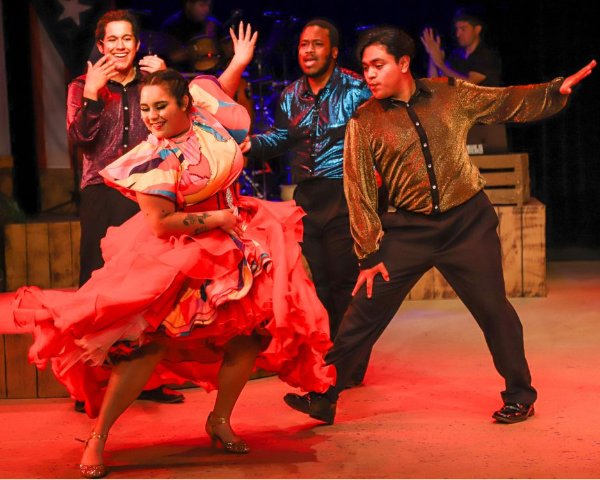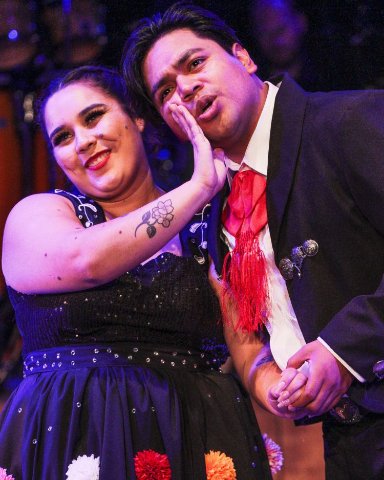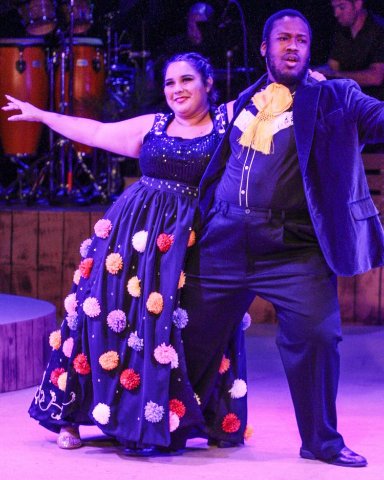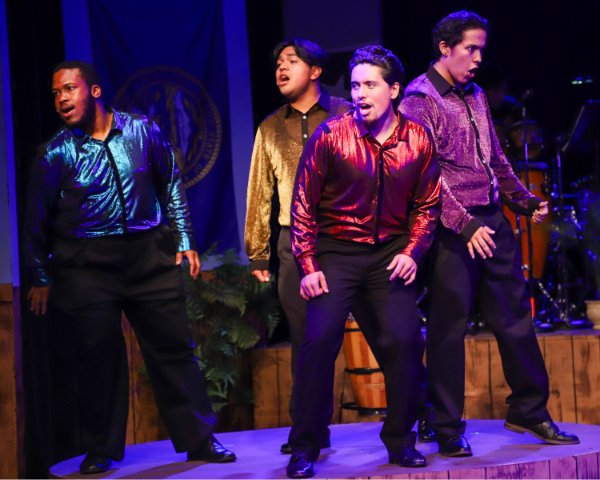4 Guys Named Named José...and Una Mujer Named Maria
A Latin American Jukebox Musical at 6th Street Playhouse
By: Victor Cordell - Sep 01, 2024
The motivation of “4 Guys Named José…and Una Mujer Named Maria!” is very straight forward, to celebrate the rich history of Latin American music and dance. The paper-thin wrapper for the narrative sets the unexpected stage in Omaha, Nebraska where four young Latino men pine for their traditions and for romance. Each is named José, and each draws on a heritage rich in music and considerable social presence in the United States – Mexico, Puerto Rico, Cuba, and Dominican Republic. In walks an unknown Maria, and what ensues are bits of 47 songs from the Latin American songbook.
Hispanic Latin America is quite remarkable in many ways. Nowhere else in the world is there such a concentration of land mass and countries that speak one language and draw primarily on the mix of two cultures – Spain and various Native American peoples, with an admixture of African influence as well, especially realized in music and dance. From the southern border of the United States to Tierra del Fuego, 14 continental countries and a number of Caribbean islands fit this classification.
The United States set standards for new popular music and dance in the 20th century, but Latin America followed, exceeding Europe and the rest of the world. Among the dance innovations were the tango, cha cha, meringue, samba, cumbia, mambo, salsa. No doubt, you can think of more.
The 6th Street Playhouse production of this jukebox musical is lighthearted and nostalgic for those with a connection to the music and the cultures. The opening night audience was fired up by partisans, though clearly there are ifs and buts with the play and the production.
Driven by a very charming cast, the action speeds by so that the 90 minutes of stage time goes very quickly. Despite the Josés receiving first billing in the title, Maria is the center of the show, and Reilly Milton brings skills and energy to the role. From her opening with the classic “Perfidia,” her strong and consistent stage-musical style singing stands out. Her dancing also excels, especially with expressive use of hands to add to the overall movement effect (the men tend to emphasize hips). Her enduring smile engages, and her well-tuned comic skills are essential to the success of the production.
Songs run the gamut from revised traditionals like the Cuban patriotic “Guantanamera” and the Mexican folk dance and romance “La Bamba” to original rock-pop like the Puerto Rican “Living la Vida Loca” and the Cuban-American “Conga.” But the best sounds come from the harmonies of “Amor” and the fine medley of great music - “Sway,” ”Quizas, Quizas, Quizas,” and “Besame Mucho.”
Music Director Nate Riebli extracts fantastic Latin sound and depth from a band of only three instruments. Importantly, the drum and piano rhythms capture the groove that drives Latin dance and enhances Choreographer (and Stage Director) Erin Rose Solorio’s dance numbers, which are generally performed with confidence, flair, and occasional over-the-top hamming-it-up. Other creative elements such as diverse costumery (Adriana Gutierrez) and varied lighting (April George) add to the appeal.
The greatest need for improvement in the production is the singing of the Josés. Jonathen Blue generally meets the standard, and the others have moments, but not enough. Sometimes singing is weak, non-melodious sounding, and even off key. Despite amplification, voices often lack sufficient power.
Several omissions from the musical itself limit its breadth and perhaps its appeal. Although Maria is the focal character, she is the only female performer. This concept could work well with an equal number of males and females in the cast, and it would appear less sexist.
While the Josés are named by their differing origins, little in the narrative differentiates the four cultures. A sequence of four “Nostalgia Songs” represents the different places the José’s families were from, but the songs drag and don’t distinguish. The threads that bind Latin communities together are generally expressed as family, love, song, and dance, but the first three in particular are pretty generic.
Perhaps younger people of Latin extraction relate to the whole repertoire in the show. But with rare exception, theatrical success depends on satisfying typical theater goers, and a larger proportion of selections familiar to that group would help. Finally, there is one song involving Carmen Miranda topped by her typical fruited headpiece, but otherwise the whole Latin Brazilian canon is ignored, as is the Jamaican and other non-Spanish sources of song.
Hopefully, the weaker elements of the production are attributable to opening night jitters and technical glitches that will be sorted out, as there is much to enjoy in the show.
“4 Guys Named José…and Una Mujer Named Maria!” is conceived by David Coffman and Dolores Prida, with book by Dolores Prida, is produced by 6th Street Playhouse and plays on its stage at 52 West 6th Street, Santa Rosa, CA through September 22, 2024.




